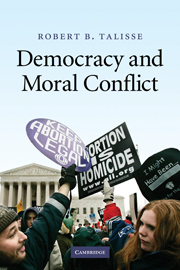Introduction
Published online by Cambridge University Press: 03 December 2009
Summary
Democracy is in crisis. So we are told by nearly every outlet of political comment, from politicians and pundits to academicians and ordinary citizens. This is not surprising, given that the new millennium seems to be off to a disconcerting and violent start: terrorism, genocide, torture, assassination, suicide bombings, civil war, human rights abuse, nuclear proliferation, religious extremism, poverty, climate change, environmental disaster, and strained international relations all forebode an uncertain tomorrow for democracy. Some hold that democracy is faltering because it has lost the moral clarity necessary to lead in a complicated world. Others hold that “moral clarity” means little more than moral blindness to the complexity of the contemporary world, and thus that what is needed is more reflection, self-criticism, and humility. Neither side thinks much of the other. Consequently our popular democratic politics is driven by insults, scandal, name-calling, fear-mongering, mistrust, charges of hypocrisy, and worse.
Political theorists who otherwise agree on very little share the sense that inherited categories of political analysis are no longer apt. Principles and premises that were widely accepted only a few years ago are now disparaged as part of a Cold War model that is wholly irrelevant to our post-9/11 context. An assortment of new paradigms for analysis are on offer, each promising to set matters straight and thus to ease the cognitive discomfort that comes with tumultuous times.
- Type
- Chapter
- Information
- Democracy and Moral Conflict , pp. 1 - 10Publisher: Cambridge University PressPrint publication year: 2009



